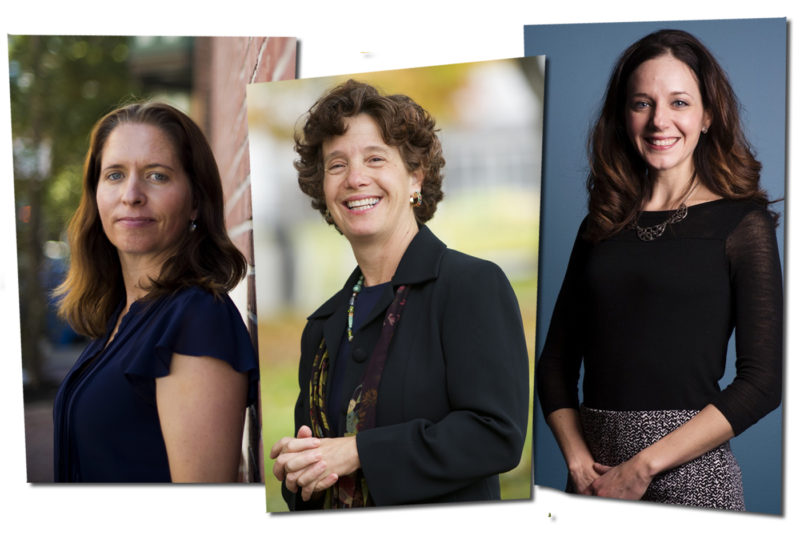The PhD in Sociology is designed to prepare students for a range of career options, post-graduate educational opportunities, and a life of engaged, democratic citizenship. Through a rigorous curriculum, students experience methodological, theoretical, and substantive training aimed at enhancing critical thinking, social awareness, and a globally-oriented conception of inequality and justice.
In The News
Embedded in interdisciplinary networks and committed to experiential knowledge, the Sociology department is well-positioned to help solve the world’s most pressing problems—from health disparities, to the impacts of climate change, to the inclusion, recognition, and dignity of persons marginalized by race, ethnicity, religion, gender, and sexuality, to growing wealth disparities and labor exploitation, to the full inclusion of refugees and migrants.
Through a rigorous curriculum, our students experience methodological, theoretical, and substantive training aimed at enhancing critical thinking, social awareness, and a globally-oriented conception of inequality and justice.
We encourage students to forge close working relationships with our faculty, who contribute to a range of interdisciplinary research projects, programs, and centers across the College of Social Sciences and Humanities and throughout Northeastern University, including the Institute for Health Equity and Social Justice Research, the Social Science Environmental Health Research Institute, the Center for International Affairs and World Cultures, the Brudnick Center on Violence and Conflict, the Summer Institute on Engaging Geography in the Humanities, and the Program on Human Rights in the Global Economy, the Women’s, Gender and Sexuality Studies Program, among others.
Learn more about the PhD program in Sociology from the College of Social Sciences and Humanities.
- Annual departmental workshops on academic writing, teaching, grant writing, media relations, and other “professional development” matters
- Funded research opportunities through faculty and affiliated centers
- Small cohort sizes afford students the opportunity to forge close working relationships with the faculty.
- Committed to reflecting inward on ourselves as educators, students, and members of the community by continuing to build an anti-racist department.
- Bachelor’s and Master’s program entry
- Offer a strong curricular foundation in sociology and the social sciences.
- Inculcate in students a depth of knowledge in the basic tools of the discipline.
- Train our students to be outstanding teachers and researchers.
- Provide a professional socialization that adequately prepares students for a career in the discipline.
Northeastern’s signature experiential learning model combines academics with professional practice to help students acquire relevant, real-world skills they can apply to their desired industry. Each program offers its own unique experiential learning opportunities, but they might include:
- EXPERIENTIAL RESEARCH OPPORTUNITIES: Our doctoral students gain real-world experience working with research centers and conducting field work. Experiential fellowships that place students into nonprofits, state agencies, and industry settings may be available in some doctoral programs. Through summer scholars programs, doctoral students can work with agencies doing work closely related to their dissertation research.
- In-Class Case Studies — Professors integrate case studies and exercises into the classroom to bring a real-world perspective and relevance to what they’re teaching.
- Research — Students collaborate with faculty in our more than 30 federally funded research centers, tackling some of the most pressing challenges in health, security, and sustainability.
Our graduates pursue careers within academia and beyond.
- Mount Ida College
- Crittenton Women’s Union
- Virgina Tech University
- Dana-Farber Cancer Institute
- Columbia University – Teacher’s College
- Johnson & Wales University
- Curry College
- Swank Properties
- St. Lous University
- University of Massachusetts, Boston
- University of Massachusetts, Dartmouth
- University of Washington, Tacoma
- Trinity College
- University of Massachusetts Donahue Institute’s Economic and Public Policy Research
- Nazarene College
- Witchita State University
Application Materials
- Application
- Application fee – US $100
- Personal statement
- Unofficial transcripts from all institutions attended
- English proficiency for international applicants
- Three letters of recommendation
- Scores from the Graduate Record Examination (GRE) – Optional
- Writing sample
- Resumé
- Writing sample
- Applicants seeking enrollment prior to the Fall 2023 term should apply through this link.



